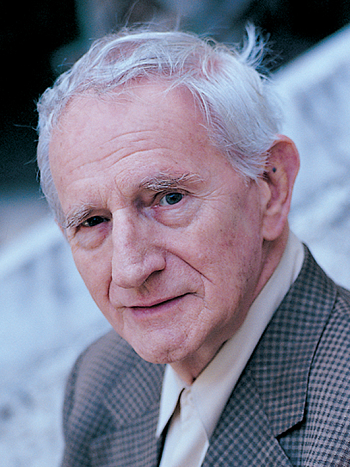
Photo credit: Weizmann Institute of Science
Michael Sela was born as Mieczyslaw Salomonowicz in Poland in 1924. In 1935 he moved with his family to Roumania and in 1941 came to Palestine/Israel. He is an Institute Professor of Immunology at the Weizmann Institute of Science, of which he was President from 1975 to 1985 and served as a Deputy Chairman of the Board of Governors from 1985 to 2004.
Scientifically, Michael Sela became known for his research on synthetic antigens, where he was among the first who introduced the use of linear and branched synthetic polypeptides as antigens. His work has led to the discovery of the genetic control of the immune response, as well as to the design of vaccines based on synthetic molecules. He is the recipient of nine honorary doctoral degrees from institutions in the U.S., France, Mexico and Israel. He is a member of 15 Academies of Science in various countries, including the U.S. National Academy of Sciences. Details of his life and work can be found in his autobiographical article “My World Through Science”, in Comprehensive Biochemistry Vol. 43 (2004), pp. 1-100.
 Interview with Michael Sela.pdf
Interview with Michael Sela.pdf
Interview Excerpt
UD: My next questions are related to the early Israeli German science cooperation, of which you have been one of the main architects.
MS: The main figure was Wolfgang Gentner. He was a fantastic person and influenced me very much. The cooperation had two origins. The first was the meetings between Amos de Shalit and Gentner at CERN, where Gentner was director, the second was Dr Josef Cohn who through Dannie Heineman succeeded to contact Adenauer and provide his backing to the enterprise. Later, when Butenandt was president of the Max Planck Society. Gentner always told me: Butenandt will certainly go after you, never invite him!
UD: Did Gentner tell you why he should not be invited? Did Butenandt try to contact you?
MS: Gentner in his typical way did not tell anything more. But it was clear that he had strong reasons. Yes, Butenandt tried to come to Israel - I met him several times at the Minerva meetings - but I never invited him.
I became also a member and later Chairman of EMBO, the European Molecular Biology Organisation (founded in 1964). John Kendrew, the director of the EMBO laboratory, was a close friend of mine, and I became the head of the scientific advisory board of the EMBO lab. At the time it was already decided that its first laboratory should be in Germany because it had no international laboratories, and I contributed to the decision that it should be established in Heidelberg because I thought that in Munich, the other place that was discussed, the lab would have been only one outstanding lab among many MPIs, and because I knew that Gentner and his Institute could be of great help.
Related Interviews: Jack Dunitz